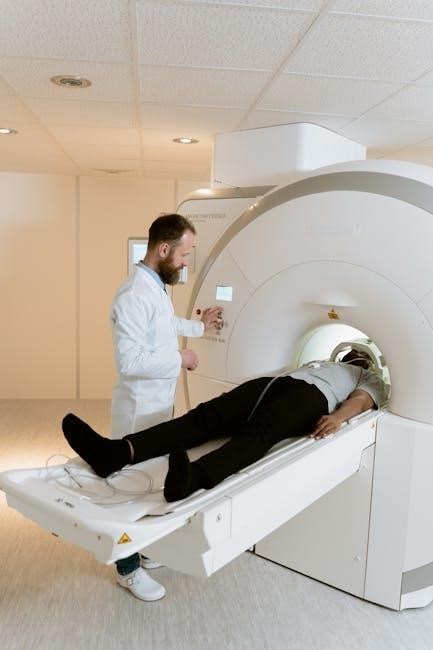Antisocial Personality Disorder (ASPD) is a mental health condition characterized by a pattern of disregard for others’ rights, manipulation, and irresponsible behavior․ It is typically diagnosed in adults over 18, as it involves long-standing traits that impair social and occupational functioning․ ASPD is often associated with antisocial behavior, including deceitfulness, impulsivity, and a lack of empathy․ Early detection and proper psychological evaluation are crucial for effective management and treatment․ Various assessment tools, such as the Antisocial Personality Questionnaire (APQ) and the Personality Inventory for DSM-5 (PID-5), aid in identifying and understanding this disorder․
1․1 Definition and Overview
Antisocial Personality Disorder (ASPD) is a mental disorder characterized by a pervasive pattern of manipulation, deceit, impulsivity, and lack of empathy․ It involves significant impairments in personality functioning, manifesting as disregard for others’ rights and feelings․ Diagnosis often relies on comprehensive assessments, including tools like the Antisocial Personality Questionnaire (APQ) and the Personality Inventory for DSM-5 (PID-5)․
1․2 Prevalence and Demographics
Antisocial Personality Disorder (ASPD) affects approximately 2․78% of males and 0․53% of females globally․ Men are more likely to be diagnosed, with a significant gender disparity observed․ Prevalence rates vary across regions, influenced by cultural and societal factors․ Assessment tools like the Antisocial Personality Questionnaire (APQ) and Personality Inventory for DSM-5 (PID-5) help identify these patterns, aiding in understanding demographic trends and disorder impact․

Key Features of ASPD
Key features of ASPD include manipulation, deceitfulness, impulsivity, and lack of empathy․ Individuals often exhibit irresponsible behavior and aggression, with a disregard for societal norms and others’ rights․
2․1 Core Traits and Characteristics
Core traits of ASPD include a persistent pattern of disregard for others’ rights, manipulation, and impulsivity․ Individuals often exhibit deceitfulness, aggression, and a lack of empathy․ These characteristics manifest in irresponsible behavior, such as failing to honor obligations or engage in planned activities․ Manipulative tendencies and a tendency to engage in unlawful or risky behaviors are also common․
2․2 Differentiation from Other Disorders
ASPD differs from psychopathy, though they share traits like manipulativeness․ Unlike psychopathy, ASPD is marked by impulsivity rather than calculated behavior․ It should also be distinguished from borderline personality disorder (BPD), which involves emotional instability, and narcissistic personality disorder, characterized by grandiosity․ Accurate differentiation requires assessing specific behavioral patterns and diagnostic criteria to avoid misclassification․
Diagnosis Criteria for ASPD
ASPD is diagnosed based on significant impairments in personality functioning, including deceitfulness, impulsivity, and lack of empathy․ A pattern of irresponsible and antisocial behavior must be present since age 15, with symptoms evident in multiple contexts․ A comprehensive psychological evaluation and clinical interview are essential for an accurate diagnosis, ensuring other disorders are ruled out․
3․1 DSM-5 Diagnostic Criteria
The DSM-5 outlines specific criteria for diagnosing ASPD, including significant impairments in personality functioning․ These involve identity and self-direction issues, along with antagonistic or disinhibited traits such as manipulativeness, deceitfulness, and impulsivity․ Additionally, individuals must exhibit a pattern of antisocial behavior, with evidence of conduct disorder before age 15 and continued antisocial actions in adulthood․ Psychological evaluation is essential for accurate diagnosis․
3․2 Clinical Evaluation Process
The clinical evaluation for ASPD involves a comprehensive psychological assessment, including clinical interviews and structured questionnaires․ Tools like the Antisocial Personality Disorder Test (APD Test) and the Antisocial Personality Questionnaire (APQ) are used to evaluate deviant traits and antisocial behavior․ These assessments help confirm the diagnosis, rule out co-occurring disorders, and guide personalized treatment plans․ Regular monitoring of symptoms ensures effective therapy and tracks progress․
Available Tests for ASPD
The Antisocial Personality Disorder Test (APD Test) and the Antisocial Personality Questionnaire (APQ) are commonly used to assess traits associated with ASPD․ These tools evaluate deviant behavior, manipulation, and disregard for others, aiding in accurate diagnosis and treatment planning․
4․1 Antisocial Personality Disorder Test (APD Test)
The Antisocial Personality Disorder Test (APD Test) is a self-report assessment tool designed to evaluate traits associated with ASPD․ It includes questions about manipulative behavior, impulsivity, and disregard for others’ rights․ The test is often used in clinical settings to aid in diagnosis and monitor treatment progress․ Higher scores may indicate elevated antisocial tendencies, guiding therapeutic interventions․
4․2 Antisocial Personality Questionnaire (APQ)
The Antisocial Personality Questionnaire (APQ) is a self-report tool designed to assess traits linked to ASPD․ It evaluates deviant behaviors, impulsivity, and manipulative tendencies․ Comprising multiple items, the APQ covers aspects like disregard for others and antisocial conduct․ It is widely used in clinical settings to aid in diagnosis and monitor treatment progress, helping clinicians identify patterns of antisocial behavior and guide interventions effectively․
Treatment and Management of ASPD
Treatment for ASPD often involves psychological therapy, focusing on reducing aggression and improving interpersonal skills․ Cognitive-behavioral techniques and specialized programs aim to address manipulative behaviors and impulsivity, helping individuals manage their symptoms and integrate better into society․
5․1 Therapeutic Approaches
Therapeutic approaches for ASPD focus on addressing manipulative and impulsive behaviors․ Cognitive-behavioral therapy (CBT) is commonly used to help individuals identify and change harmful patterns․ Psychoeducation and specialized programs aim to reduce aggression and improve interpersonal skills․ These interventions often target violent behavior and aim to enhance emotional regulation and empathy, promoting better societal integration and reduced recidivism rates․
5․2 Role of Psychological Therapy
Psychological therapy plays a crucial role in managing ASPD by addressing underlying behavioral patterns․ Evidence-based approaches like cognitive-behavioral therapy (CBT) and mentalization-based therapy aim to reduce aggression and improve interpersonal skills․ These therapies focus on enhancing emotional regulation, empathy, and responsible decision-making․ A recent study highlighted a new psychological therapy designed to reduce violence and aggression in male offenders with ASPD, showing promising results․
Psychopathy vs․ ASPD
Psychopathy and ASPD share antisocial traits, but psychopathy often involves manipulative charm and callousness, while ASPD focuses on irresponsible behavior and disregard for others․
6․1 Understanding the Differences
Psychopathy and ASPD share overlapping traits, such as antisocial behavior and disregard for others․ However, psychopathy often involves manipulative charm and emotional detachment, while ASPD focuses on irresponsible behavior and impulsivity․ Psychopathy typically includes a lack of empathy and superficial charm, whereas ASPD is characterized by a pattern of manipulation and deceit without the same level of emotional coldness․ Diagnostic tools like the Antisocial Personality Questionnaire (APQ) and Personality Inventory for DSM-5 (PID-5) help distinguish these conditions based on specific criteria․
6․2 Diagnostic Overlap and Distinctions
While ASPD and psychopathy share traits like antisocial behavior and disregard for others, they are distinct conditions․ Psychopathy typically involves manipulative charm and emotional detachment, whereas ASPD focuses on irresponsible behavior and impulsivity․ Both conditions often co-occur, making diagnosis challenging․ Diagnostic tools like the Antisocial Personality Questionnaire (APQ) and Personality Inventory for DSM-5 (PID-5) help differentiate by assessing specific criteria, ensuring accurate distinctions․
Screening Tools and Assessments
Standardized tools like the Personality Inventory for DSM-5 (PID-5) and the International Personality Disorder Examination (IPDE) are used to assess ASPD․ These tools help identify deviant traits and evaluate symptoms systematically, aiding in early detection and monitoring of treatment progress․ They provide a structured approach to understanding antisocial tendencies and associated behaviors․
7․1 Personality Inventory for DSM-5 (PID-5)
The Personality Inventory for DSM-5 (PID-5) is a 220-item self-rated assessment tool designed for adults aged 18 and older․ It evaluates maladaptive personality traits across various domains, including antisocial tendencies․ The PID-5 helps identify impairments in personality functioning and facilitates accurate diagnoses by measuring traits such as manipulativeness, deceitfulness, and callousness, which are key indicators of ASPD․
7․1 Personality Inventory for DSM-5 (PID-5)
The PID-5 is a comprehensive tool used to assess maladaptive traits linked to ASPD, focusing on domains like manipulativeness and deceitfulness․ It aids in identifying impairments in personality functioning, providing a structured approach to diagnosing and understanding antisocial tendencies effectively․
7․2 International Personality Disorder Examination (IPDE)
The International Personality Disorder Examination (IPDE) is a semi-structured clinical interview designed to assess personality disorders, including ASPD․ It evaluates traits such as manipulativeness, deceitfulness, and impulsivity, aligning with DSM-5 and ICD-10 criteria․ The IPDE aids in diagnosing ASPD by identifying maladaptive patterns and impairments in social and occupational functioning, ensuring accurate and reliable diagnostic outcomes․

Importance of Early Detection
Early detection of ASPD is crucial for effective intervention, improving treatment outcomes, and reducing long-term societal and personal impacts of antisocial behaviors and traits․
8․1 Benefits of Early Intervention
Early intervention in ASPD can significantly reduce aggression and violent behaviors, enhance emotional regulation, and improve interpersonal skills․ It fosters a supportive environment for individuals to develop healthier coping mechanisms and societal integration․ Timely psychological therapy and structured programs can address underlying issues, leading to better long-term outcomes and reduced criminal tendencies․
8․2 Impact on Treatment Outcomes
Early detection of ASPD improves treatment effectiveness by addressing core issues before they escalate․ Psychological therapies, such as cognitive-behavioral approaches, demonstrate better outcomes when initiated early․ Comprehensive assessments guide tailored interventions, enhancing patient engagement and long-term recovery․ Early intervention is vital for reducing symptom severity and improving quality of life in individuals with ASPD․

Challenges in Diagnosing ASPD
Challenges in diagnosing ASPD often arise from co-occurring disorders and overlapping symptoms with conditions like psychopathy․ Accurate diagnosis requires comprehensive psychological evaluations and detailed patient histories․
9․1 Co-Occurring Disorders
Co-occurring disorders, such as substance abuse, mood disorders, and anxiety, often complicate the diagnosis of ASPD․ These conditions can mask or exacerbate ASPD symptoms, making it difficult to accurately identify the disorder․ Additionally, the presence of psychopathy or other personality disorders can further obscure diagnostic clarity, requiring a comprehensive evaluation to disentangle these conditions and ensure an accurate diagnosis․
9․2 Diagnostic Challenges in Adults
Diagnosing ASPD in adults can be complex due to overlapping symptoms with other disorders, such as substance abuse or anxiety․ Adults may also mask antisocial tendencies, making it harder to identify impairments in personality functioning․ The DSM-5 criteria require clear evidence of long-standing patterns, but these may be obscured by comorbid conditions or manipulative behaviors, necessitating a thorough and nuanced clinical evaluation․

Role of Psychological Evaluation
Psychological evaluation plays a crucial role in identifying ASPD traits, utilizing tools like the Antisocial Personality Questionnaire (APQ) and structured clinical interviews to assess behavioral patterns and guide treatment․
10․1 Comprehensive Assessment Techniques
Comprehensive assessment techniques for ASPD involve detailed clinical interviews and behavioral observations․ Tools like the Antisocial Personality Questionnaire (APQ) and structured interviews are used to identify manipulative and impulsive patterns․ These methods help diagnose ASPD accurately and guide effective treatment plans tailored to individual needs․
10․2 Clinical Interviews and Observations
Clinical interviews and observations are essential for diagnosing ASPD․ They involve detailed discussions about behavior patterns, interpersonal relationships, and life history․ Observations help identify manipulative tendencies and lack of empathy․ These insights, combined with standardized tests like the APQ, provide a holistic understanding of the disorder, aiding in accurate diagnosis and personalized treatment strategies․
Validity and Reliability of Tests
Tests like the APQ and PID-5 are validated for ASPD assessment․ Research supports their reliability and consistency in accurately diagnosing antisocial traits․
11․1 Ensuring Test Accuracy
Accuracy in ASPD tests is ensured through rigorous validation and cross-validation studies․ Tools like the APQ and PID-5 are designed to align with DSM-5 criteria, ensuring reliable assessment of antisocial traits․ Clinical interviews and observational data are often used to confirm test results, enhancing diagnostic precision and reducing false positives․
11․2 Research on Test Reliability
Research indicates that standardized tests for ASPD, such as the APQ and APD Test, demonstrate moderate to high reliability․ Studies show consistent test-retest results, ensuring accuracy in measuring antisocial traits․ These tools are validated against DSM-5 criteria, providing a reliable framework for assessing personality dysfunction and distinguishing ASPD from other disorders․
Ethical Considerations in Testing
Ethical testing for ASPD requires ensuring confidentiality, informed consent, and cultural sensitivity․ Tests must avoid bias and respect patient rights, adhering to professional guidelines․
12․1 Confidentiality and Patient Rights
Ensuring confidentiality is crucial when administering ASPD tests․ Patients have the right to privacy, and their personal information must be protected․ Tests should only be conducted with informed consent, and results must be shared securely․ Respecting patient autonomy and maintaining trust are essential ethical standards in psychological evaluations․
12․2 Cultural Sensitivity in Assessments
Cultural sensitivity is vital in ASPD assessments to avoid misdiagnosis․ Test administrators must consider cultural norms and values that may influence behavior interpretations․ Standardized tools like the APQ and PID-5 should be adapted to ensure relevance across diverse populations․ Ignoring cultural contexts can lead to biased results, emphasizing the need for culturally competent evaluation practices in ASPD testing․
ASPD tests like the APQ and PID-5 are essential for accurate diagnosis․ Early detection and culturally sensitive assessments are critical for effective management․ Further research is needed to refine testing methods and improve treatment outcomes for individuals with ASPD․
13․1 Summary of Key Points
Antisocial Personality Disorder (ASPD) is a complex condition requiring accurate diagnosis and management․ Tools like the Antisocial Personality Disorder Test (APD Test) and the Antisocial Personality Questionnaire (APQ) aid in identifying key traits․ Early detection and culturally sensitive assessments are vital for effective intervention․ Future research should focus on refining diagnostic tools and improving treatment strategies to address ASPD more effectively․
13․2 Future Directions in ASPD Testing
Future research should focus on developing more reliable and culturally sensitive tools for diagnosing ASPD․ Enhancing the validity of assessments like the PID-5 and APQ will improve accuracy․ Incorporating digital platforms and AI-driven analysis could streamline testing processes․ Additionally, longitudinal studies are needed to evaluate the long-term effectiveness of current diagnostic methods and therapeutic interventions for ASPD․
